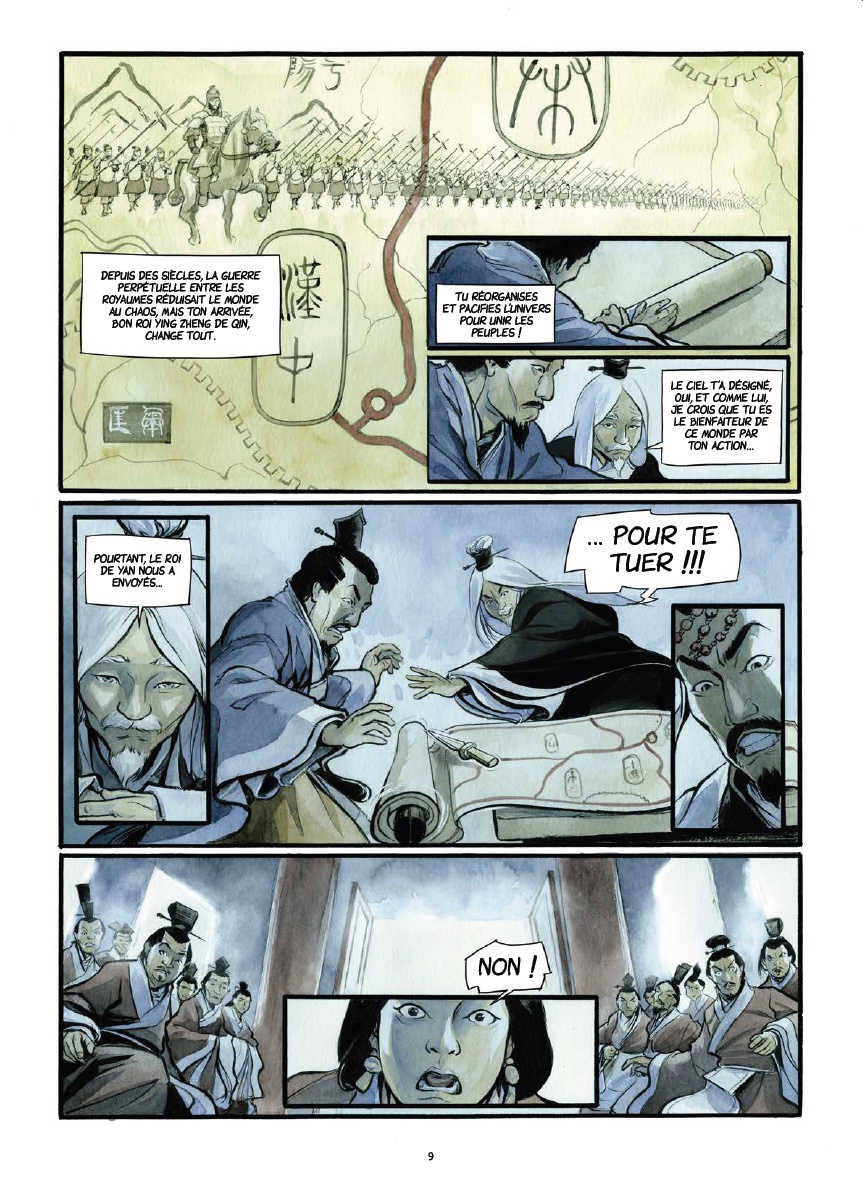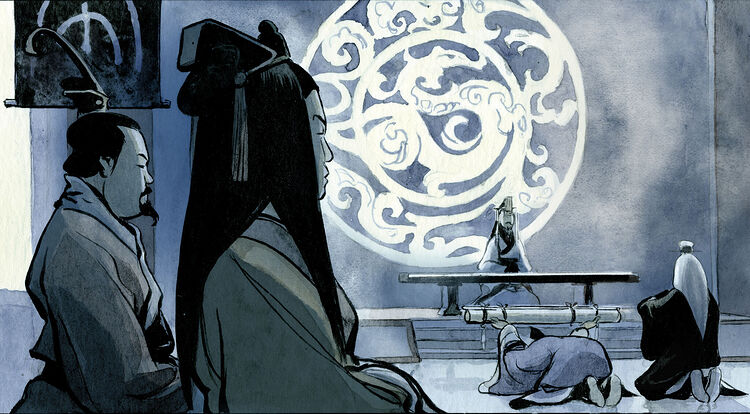Delcourt editions propose, for this fifth volume of Liu Cixin's futures, to adapt a short story that takes us into the past of China, at the time of the warring states. Illustrated by Xavier Besse, this perfection of the circle succeeds in mixing a clever historical tale with a narrative exploring the mysteries of mathematics.
The Emperor and the Scholar
227 BC, war rages between the kingdoms of the future China. The king of Qin, Ying Zhen, rules over a powerful state that worries his neighbors. Therefore, they send assassins to suppress this dangerous rival. But the scholar Jing Ke reveals the plot and saves the king's life. He saw, in fact, in the sovereign, the one who will unify everything under heaven.He even promises to help him understand the purposes of the universe and find the secret of eternal life on the condition that he helps him in his crazy project: to unlock the secrets of the circle by calculating the 100,000th decimal place of pi. The King of Qin lends his army of 3 million to this giant calculator project and begins to dream of absolute power. But in the shadow of the king, advisors and doctors take umbrage at the growing influence of this scientist. As calculations progress and conspirators agitate, the King of Qin is faced with his own doubts. Should he follow this mysterious sage or should he rather follow the advice of the court? 
The perfection of the circle: a variation on power
Qin Shi Huangdi is a central and complex figure in Chinese history. First (partial) unifier of China, we owe him many reforms (roads, weight), the launch of the first wall in the North against the nomadic tribes and the erection of a gigantic mausoleum, part of which was exhumed in Xi'an (the Terracotta Army). But he is also a terrible dictator who massacred his half-brothers, executed the mother's lover, repressed scientists and caused the death of thousands of Chinese for his pharaonic projects. An iron fist in the service of a dynasty that will not survive him (his son being overthrown by a revolt). The B.D. by Xavier Besse invites us to return to some elements of this story. Thanks to a very careful drawing and an inspiration that looks towards the films The Emperor and the Assassin or Hero (films that feature the first emperor), he makes us feel all the ubris of this first emperor reigning over millions of subjects. In search of immortality, he sacrifices immense resources to his chimera while he forcefully represses any failure, any delay. It is a part of ancient Chinese history that is told to us. 
The madness of a Man
The Perfection of the Circle paints a chilling psychological portrait of the madness of a man convinced of the greatness of his destiny. Obstinate, cold, nothing distracts him from his final goal. Xavier Besse uses both fiction and history to question the origin of the madness that grows in the mind of this tyrant. Is it the absorption of mercury, the flattery of courtiers and sages that are the cause of its imbalance and paranoia? Or, are these disorders consubstantial with the practice of solitary power and the daily struggle to eliminate its opponents? This comic, without providing a single answer, remains uncompromising on the weakness of Man in the face of his inner demons. Here, it's all about pride, fear of death, the search for meaning and immortality. Even the most powerful are slaves to these torments that condemn them to the abyss. And we still salute the atmosphere of this album which depicts with finesse the decline of this king who ends up crushed by his own weaknesses. 
The Perfection of the Circle: Science without Conscience is Only the Ruin of the Soul
This album offers an interesting reflection on science and belief. Indeed the other hero is the scientist who links the calculation of the number pi to the discovery of eternal life. Is he crazy? No one knows it, but by imposing complex movements on the soldiers of Qin, he manages to develop an embryo of numerical calculation and to evoke, through the shapes drawn by the queues of men, the shape of a computer or a microprocessor. And if everything seems to be a deception, the author questions this blind submission to a science that wants to be divinatory and then scratches the figure of the scientist. If the goal of the latter is laudable, is the man (the king), whom he has chosen to lead this project, the right one? The answer is no and there are many signs of it. It will take time, however, for the scholar to recognize his mistakes. And even so, he will prefer to blame others rather than take his share of responsibility for the king's downfall. The Perfection of the Circle is a nice and very original story; A fable about the corruption of power, the weakness of the human soul and the danger of blindness. Find the review of the Tezucomi series always at Delcourt editions



















